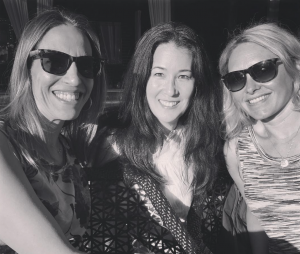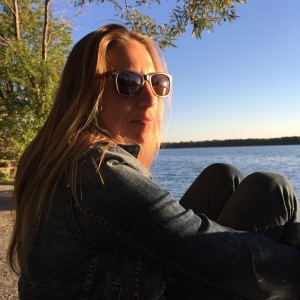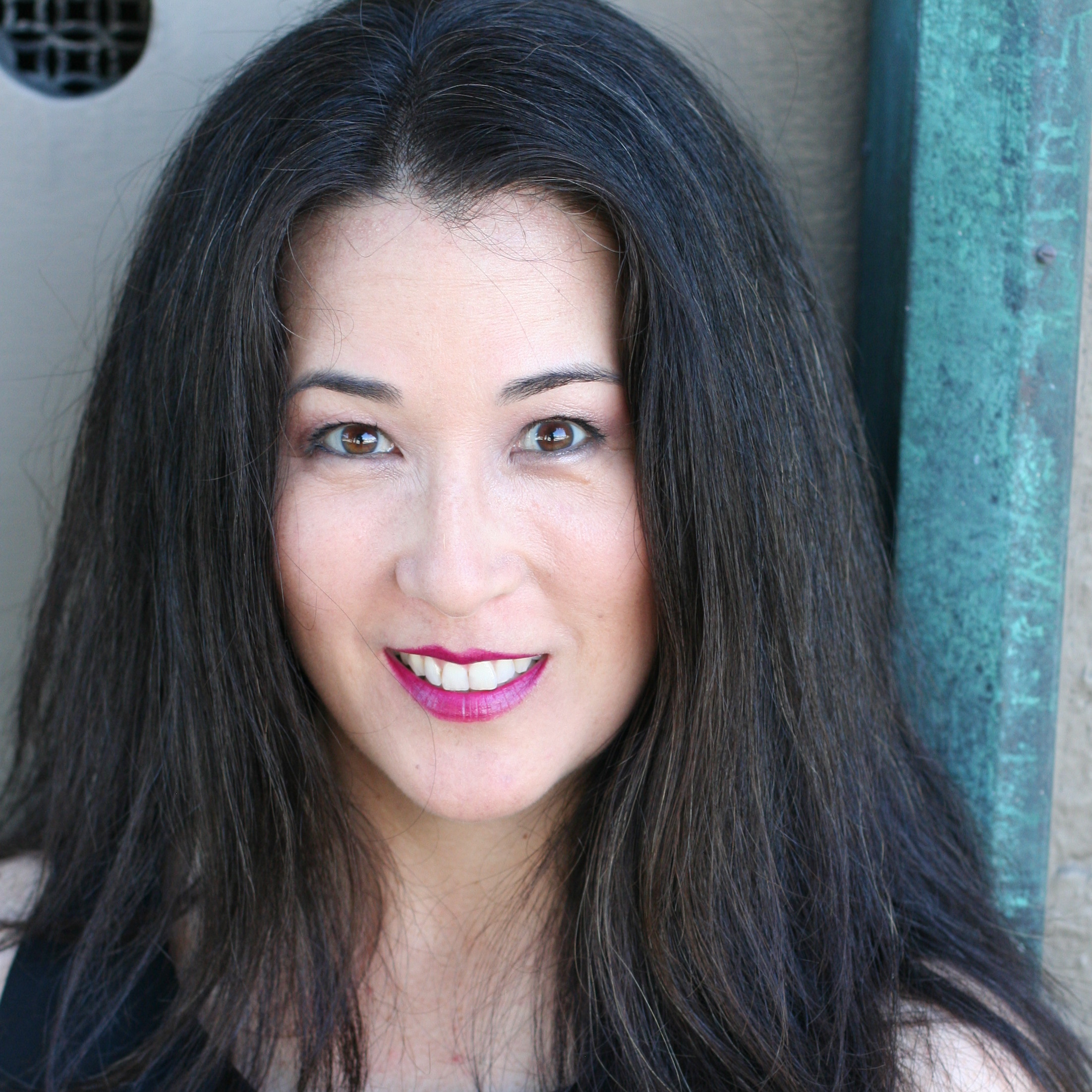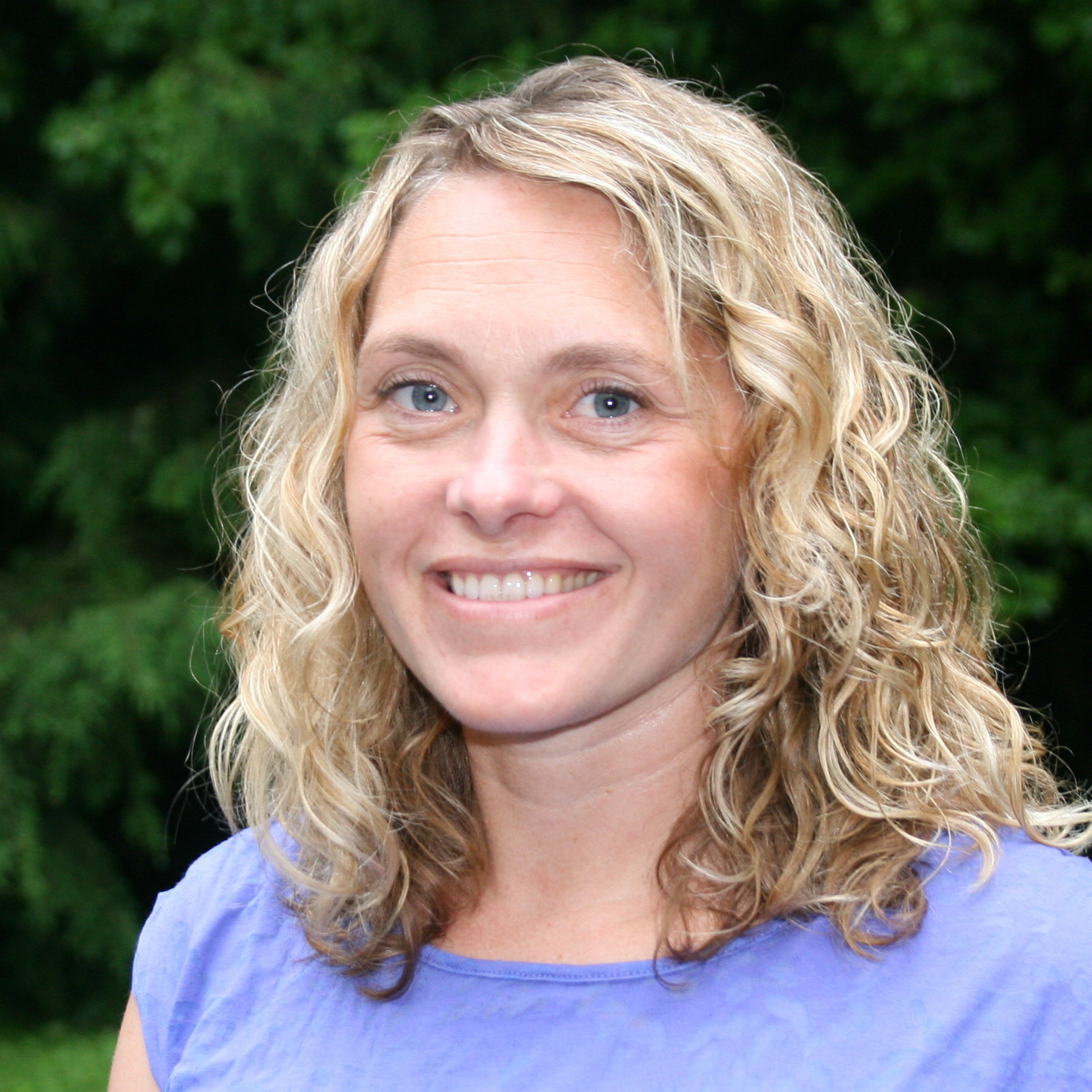2016 AWP Round-Up.

In past years, I found the Association of Writing Programs conference overwhelming — the massive AWP conference hosts over 11,000 writers, all under one roof — but this year was different for me, for a few reasons: In past years, I found the Association of Writing Programs conference overwhelming — the massive AWP conference hosts over 11,000 writers, all under one roof — but this year was different for me, for a few reasons:
 I went with Christina Cha and Tara Bragg, two of our Story Intensive TAs, and it was absolutely wonderful to connect in person.
I went with Christina Cha and Tara Bragg, two of our Story Intensive TAs, and it was absolutely wonderful to connect in person.
The sunshine, the green juice, and the weird magic of Los Angeles made the crowds feel more… fun.
This year, I was there to represent Story Is a State of Mind.
SSMind isn't an idea, anymore. I know this shouldn't come as a surprise to me, but you know this online "thing" I created? It's a writing school.
Story Is a State of Mind is an engaged and intelligent community of writers who do meaningful work together.
We have graduates publishing their stories and novels.
We are affecting the literary landscape in a real way.
I'm proud of SSMind. I'm honoured to be a part of it. I want to keep giving our school what it needs to shine, because writers really need it.
This is what I came away from this conference knowing, like ground knows gravity:
Story Is a State of Mind is special. There is nothing else like it.
It's not that this is news or anything, I know. It's just that being at AWP gave me a new perspective. It's hard to quantify a digital community -- it's immaterial. By its nature, it's shapeless, weightless, and mostly invisible. It works in the dimension of consciousness, creative ethers, magic, and electromagnetic energy. And the AWP Conference put our school into context.
It showed me a new, clear reflection of our school, within that context.
On the flight back, while writing notes about the weekend, I realized that the Story Is a State of Mind community actually includes more writers than were present at the AWP conference itself.
SSMind writers could fill the Los Angeles Convention Centre.
I honestly don't know how to process that. It feels appropriate to high-five you, and all of the other writers reading this, right now. High-fives!
I will keep giving you what you need in this unconventional creative writing school, so you continue to feel met, supported, challenged, and instructed.
With beauty. With colour, music, and white space. With joy.
And no fluorescent lights!
Here's to your beautiful writing practice.
xo,

Tara, Christina and I took copious notes from our weekend at AWP. There was so much to digest! I put together a few highlights:
Sarah's AWP highlights:
 from Susan Orlean: "Writing is a magical process, but it's useful to demystify it as much as you can."
from Susan Orlean: "Writing is a magical process, but it's useful to demystify it as much as you can."
"You have to convince yourself that your perspective should be heard, so you don't get into the trap of 'why would anyone care what I say?' I've made a choice to be a storyteller. This is not based on my authority of knowledge, but my choice to be a person who tells stories."
Susan Orlean's toolkit (what to do in case you're stuck):
-
Stop. Walk away. Don't push through. Think: Do you need to digest what you've already learned? Do you need to learn more?
-
Talk it out with someone. Say it out loud. What are you trying to write? You'll see the place where you don't have the answer -- the gaps will show themselves.
-
Erase your previous efforts. Throw it away. You don't want to be editing the bad thing that isn't working. Start from scratch.
from Christopher Castellani:
"Remember that you got into this because you loved to play. Remember playing with Barbies and GI Joes? Writing should feel like that."
"Write outside the story you're writing about. Write outside the story, and pretend it's never going to be in the story itself. Give yourself permission to write something you won't include. The writing you do will become an on-ramp to get you back onto your story."
from Melissa Stein:
"The crappy stuff we write is the grease upon which the good stuff slides out."
Melissa put together this cool list (you can download it and print it out): Writing Strategies in case of Writer's Block
from Roxane Gay:
"Whenever I'm asked to speak about race or diversity now, I say no. Everything about race that I can say, I've already said. You either know it or you don't know, and if you don't know, at this point you don't want to know, and if that's the case, I can't fix you."
"Write about whatever you want. Don't wait for permission, or a cookie. If you want to write about race, just write with some empathy."
"Separate yourself from your writing career. If you don't, you put your self worth in the hands of other people."
from Ruth Ozeki:
"Language is a ritual that we perform, but it's an invisible language -- a bloodline that connects us to our ancestors. It's living, very alive, expressing itself through us."
"The book is a collaboration between author and reader. I don't think about this when I'm writing it, though -- that would be dangerous."
from Kelly Link: "In universities there is a discomfort around genre/category. But this is a great time to be writing, because there's a lot of blur right now."
"There's often a lot of energy in the places in a story or novel that are a little weird."
Christina's AWP highlights:
 I was surprisingly stimulated by being around 12-20,000 writers. I did not collapse into a silent and staring introverted blobby mess, as I feared I would, but felt awake and curious and energized. I would love to go to another AWP.
I was surprisingly stimulated by being around 12-20,000 writers. I did not collapse into a silent and staring introverted blobby mess, as I feared I would, but felt awake and curious and energized. I would love to go to another AWP.
I was also surprised by how much relief I felt at not having to explain what I do, justify calling myself a writer, receive unhelpful “story ideas,” explain what short fiction is or “what kind of stories I write,” or answer the question, “oh, are you still writing?” I did not realize how much energy this consumes! So many times when I accidentally caught another writer’s eye, they would give me a tribe-smile. So sweet, especially from the young women writers.
I got a very strong and flirty version of this from someone that may or may not have been Andre Dubus III. That it still gives me a flutter even though I am not certain it was him says something about the unreality of fame and where it lives. I used to get mistaken, regularly, for Brenda from BH 90210, (back when I had bangs), and because I went to the school where they filmed 90210: The College Years. They knew I wasn't her, but they really, really wanted me to be her, and they would cluster and giggle and stare anyway.
Next AWP: Do NOT go to the Bookfair on day 3 when the collective overwhelm meltdown begins. Or do go, if you want to see and try to talk to people with empty eyes, who are hovering three feet above their bodies. It is also a good time to go if you want to get free lit journals. Writing the Hyphen: How to Explore, Not Exploit, Your Background: with Allison Amend, Carter Sickels, Pauls Toutonghi, Mira Jacob, and Danielle Evans
-
The hyphenated writer is often damned as “unrelatable”.
-
Write away from the market; all those voices can’t be in the room with you.
-
Thinking about publishing while writing will silence you.
-
“Write the story that you were always afraid to tell. I swear to you that there is magic in it, and if you show yourself naked for me, I'll be naked for you. It will be our covenant.” -- Dorothy Allison
Writer as Editor/Editor as Writer with Jill Bialosky, Rob Spillman, Hannah Tinti, Major Jackson, and James Yeh
-
“The cooling period is crucial! Never edit when you are red-hot” -- Rob Spillman
-
The most important part of revision is putting the story in a drawer. (Hearing this when I did and its lightning-in-the-head effect: this moment alone could have been enough to *make* the whole trip.)
Build It and They Will Come: Creating a School and Community Outside Academia with Edan Lepucki, Julia Fierro, Sonya Larson, Michelle Wildgen and Jason Koo
What we are doing at SSM with Sarah is even more amazing than I realized. One of the common beliefs about an online writing program is that it lacks the intimacy you can get when you are all sweating together in a room. Sarah, Tara, and I begged to differ. Plenty of sweating, plenty of intimacy. Julia Fierro of the Sacket Street Writers is just starting to branch out into online space. She was a great speaker, and I enjoyed her anti-MFA revolutionary spirit. Sarah would have been great on this panel.
Tara's AWP highlights:
 This being my first conference, I was unsure of what to expect (I foolishly read some blog posts beforehand that suggested I shouldn't be nervous — I hadn't even though of being nervous before that!). Of course, there really was nothing to be nervous about — I had an incredible experience.
This being my first conference, I was unsure of what to expect (I foolishly read some blog posts beforehand that suggested I shouldn't be nervous — I hadn't even though of being nervous before that!). Of course, there really was nothing to be nervous about — I had an incredible experience.
I was buoyed by the sense of camaraderie and the positivity that permeated all of my interactions. Not one person told me "you can't". It was all "you can" — you can write a novel, you can break the rules, you can be a relevant part of this writing community. It was a warm and inclusive feeling, and I am still using it to fuel my creative fire weeks later!
Writing Around the Block: How to Keep the Words Flowing with Susan Orlean, D.A. Powell, Dolen Perkins-Valdez, Melissa Stein, and Christopher Castellani
Panelists’ views ranged here from those who embraced “block” as a part of the creative process, to those who found ways to “power through” it. Here are a few of my takeaways:
-
D.A. Powell noted that 90% of writing is about “input” – what you are taking in is important.
- There is no such thing as wasted time – time spent thinking is productive (and necessary).
-
Write where you don’t have access to the internet!
-
Susan Orlean spoke of seeing a hypnotist about her fear of flying. He suggested that she not label the fear. Maybe we need to do the same thing with “writer’s block” and not name it that.
Build It and They Will Come: Creating a School and Community Outside Academia with Eden Lepucki, Julia Fierro, Sonya Larson, Michelle Wildgen, and Jason Koo
-
Working outside of academia allows the school freedom from conforming to expectations of a university program.
-
A common theme seemed to be a desire to develop a community, as well as a focus on craft, rather than analysis or interpretation.
-
A hesitancy to develop online programs was voiced, and it was suggested that online groups may not be able to develop the same sense of cohesion (We at SSM School know otherwise!)
Smooth Criminals: What’s at Stake When We Break the Rules with Juan Martinez, Susan Hubbard, Robin Rozanski, and Julie Iromuanya
-
Robin Rozanski received feedback about the “darkness” of her writing – “She is such a nice girl, why couldn’t she write something nice?”
-
Several writers discussed persevering despite negative feedback in relation to “colouring outside of the lines.”
-
There may be pressures to represent your own cultural grouping in a favourable light. Strive to write fearlessly, not flawlessly!
Are We There Yet?: Revising Toward a Finished Draft with Benjamin Reed, Michael Noll, Michelle Brower, Rachel Yoder, and Caroline Casey So, this panel did not have a magic formula that would allow a writer to know when a piece is completely finished (sigh), but there were several great suggestions to help you get there on your own.
-
Have a vision of your finished piece in mind, and keep striving until your work feels like that vision.
-
A lot of things can come out when you talk about your work with others – it may help you to figure out what the story wants to be.
-
You really need to develop your own gut instinct.
-
Being avid readers helps writers discover what they like, and why.
-
It is a good idea to let your story “cool off” before revising.
-
For longer works, putting scenes on index cards may help in the revising process (it is easier to pull out one index card, than to pull out a 15 page scene).
-
You can’t try to write your story for someone else.
-
If you think it’s done, submit it for another set of eyes to decide if it is really done.
Women Writing Fiction in a Post-feminist Era with Varley O’Connor, Michelle Latiolais, Emily Mitchell, Lisa Alvarez, and Melissa Pritchard
-
A “confidence gap” exists; men tend to display “honest overconfidence”, while women tend to submit and re-submit with less frequency. (see “The Confidence Code”, K. Kayy & C. Shipman)
-
It was suggested that women in fiction might be better served by displaying a “dishonest overconfidence” – acting and talking as though our work is more valued. We must believe in the significance of our own work.
-
There may be some freedom in this position – when one feels failure is inevitable, it frees one up to experiment.
-
What you make, what you create, is your power.
Kelly Link, Emily St. John Mandel, and Ruth Ozeki: A Reading and Conversation Honestly, I took no notes at all here, I simply sat back and enjoyed these readings and the subsequent conversation. A couple of things did remain with me, though:
-
Emily St. John Mandel is a rule-breaker! Her formal education was in the field of dance, and she deals with “genre” very loosely.
-
The idea of community, and even writing together (in the same room!) was recurrent.

1 comment
Leave a comment